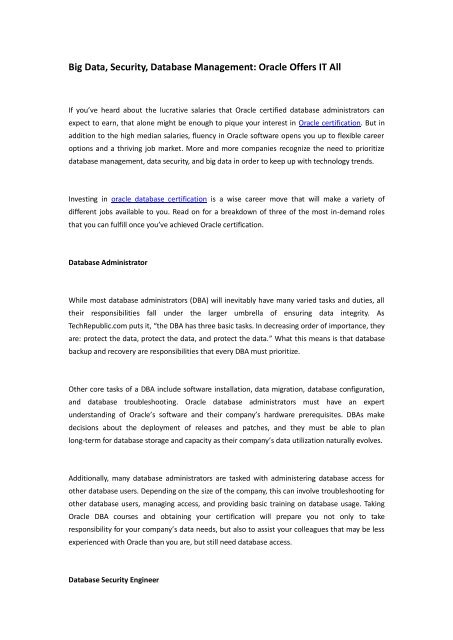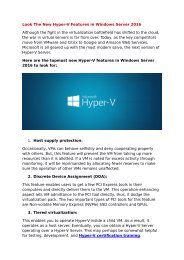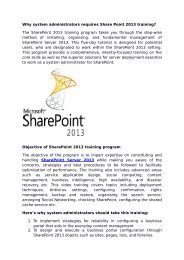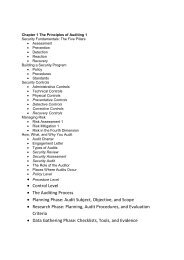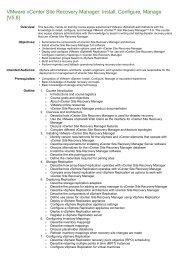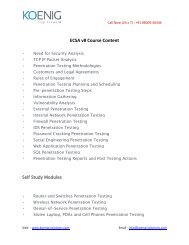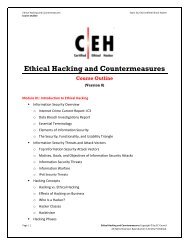Big Data, Security, Database Management- Oracle Offers IT All
You also want an ePaper? Increase the reach of your titles
YUMPU automatically turns print PDFs into web optimized ePapers that Google loves.
<strong>Big</strong> <strong>Data</strong>, <strong>Security</strong>, <strong>Data</strong>base <strong>Management</strong>: <strong>Oracle</strong> <strong>Offers</strong> <strong>IT</strong> <strong>All</strong><br />
If you’ve heard about the lucrative salaries that <strong>Oracle</strong> certified database administrators can<br />
expect to earn, that alone might be enough to pique your interest in <strong>Oracle</strong> certification. But in<br />
addition to the high median salaries, fluency in <strong>Oracle</strong> software opens you up to flexible career<br />
options and a thriving job market. More and more companies recognize the need to prioritize<br />
database management, data security, and big data in order to keep up with technology trends.<br />
Investing in oracle database certification is a wise career move that will make a variety of<br />
different jobs available to you. Read on for a breakdown of three of the most in-demand roles<br />
that you can fulfill once you’ve achieved <strong>Oracle</strong> certification.<br />
<strong>Data</strong>base Administrator<br />
While most database administrators (DBA) will inevitably have many varied tasks and duties, all<br />
their responsibilities fall under the larger umbrella of ensuring data integrity. As<br />
TechRepublic.com puts it, “the DBA has three basic tasks. In decreasing order of importance, they<br />
are: protect the data, protect the data, and protect the data.” What this means is that database<br />
backup and recovery are responsibilities that every DBA must prioritize.<br />
Other core tasks of a DBA include software installation, data migration, database configuration,<br />
and database troubleshooting. <strong>Oracle</strong> database administrators must have an expert<br />
understanding of <strong>Oracle</strong>’s software and their company’s hardware prerequisites. DBAs make<br />
decisions about the deployment of releases and patches, and they must be able to plan<br />
long-term for database storage and capacity as their company’s data utilization naturally evolves.<br />
Additionally, many database administrators are tasked with administering database access for<br />
other database users. Depending on the size of the company, this can involve troubleshooting for<br />
other database users, managing access, and providing basic training on database usage. Taking<br />
<strong>Oracle</strong> DBA courses and obtaining your certification will prepare you not only to take<br />
responsibility for your company’s data needs, but also to assist your colleagues that may be less<br />
experienced with <strong>Oracle</strong> than you are, but still need database access.<br />
<strong>Data</strong>base <strong>Security</strong> Engineer
Every DBA administrator has to think about data security to a certain extent, as that is a crucial<br />
part of ensuring data integrity. But large databases make attractive targets for hackers, which has<br />
resulted in database security emerging as a significant and fast-growing specialization within the<br />
field of database administration.<br />
The three basic tasks that go into database security are authentication (creating and controlling<br />
logins), authorization (setting and controlling permissions), and auditing (tracking who has done<br />
what to the database), as reported by TechRepublic.com. <strong>Security</strong> engineers must have a<br />
thorough understanding of their company’s security model and ensure that security standards<br />
are universally enforced. Acting as the database security engineer is a big responsibility, and DBA<br />
training is the only professional training that can adequately prepare you to take on this role.<br />
<strong>Big</strong> <strong>Data</strong> and <strong>Data</strong> Science<br />
There are a lot of misconceptions out there about what exactly it is that data scientists do. In a<br />
nutshell, the job of a data scientist can be summarized as taking more of a “big picture,”<br />
analytical approach to their company’s data, as opposed to the database administrator role<br />
which is more focused on the routine details. <strong>Data</strong> scientists find patterns in large amounts of<br />
data and connect them to real-world decisions, according to Life Hacker. <strong>Data</strong> scientists use a<br />
number of tools and a wide range of skills to run their analytical models, such as Hadoop, Python,<br />
MapReduce, and others.<br />
Navigating the world of big data requires not only a complete understanding of the nuts and<br />
bolts of databases, but also a background in statistics, software, and even the social sciences<br />
come in handy. In an interview with Life Hacker, data scientist Dan Mallinger explains, “data<br />
science begins by translating a business case into an analytics agenda. Much more time is spent<br />
developing hypotheses, understanding data, exploring patterns, and measuring impact than<br />
selecting algorithms.”<br />
While a multidisciplinary background is useful for getting into data science, it would be a mistake<br />
to look at the educational requirements of this career and assume that big data is out of reach for<br />
you. <strong>Oracle</strong> DBA courses can provide you with the fundamentals you need to start exploring a<br />
career as a data scientist.
What Steps to Take<br />
As you can see, <strong>Oracle</strong> DBA training can open up many doors in your career. If one or more of the<br />
jobs within database administration appeal to you, the next step is to get certified. <strong>Oracle</strong><br />
<strong>Data</strong>base 12C and 12C Release 2 certifications will tell every possible employer that your <strong>Oracle</strong><br />
expertise can be trusted. Once you have become an <strong>Oracle</strong> Certified Associate (OCA), it’s possible<br />
to seek further <strong>Oracle</strong> DBA training to become an <strong>Oracle</strong> Certified Professional (OCP) next. As an<br />
<strong>IT</strong> professional, be sure to act soon to take this opportunity to increase your body of knowledge<br />
as well as the potential size of your paycheck.<br />
Resource:- <strong>Big</strong> <strong>Data</strong>, <strong>Security</strong>, <strong>Data</strong>base <strong>Management</strong>: <strong>Oracle</strong> <strong>Offers</strong> <strong>IT</strong> <strong>All</strong>


